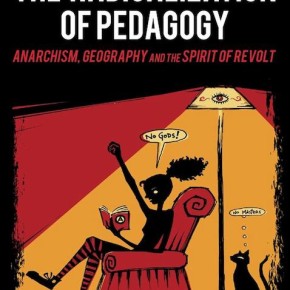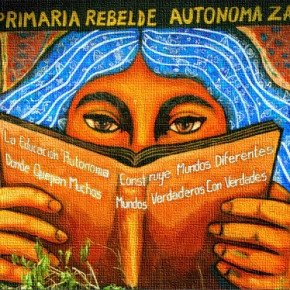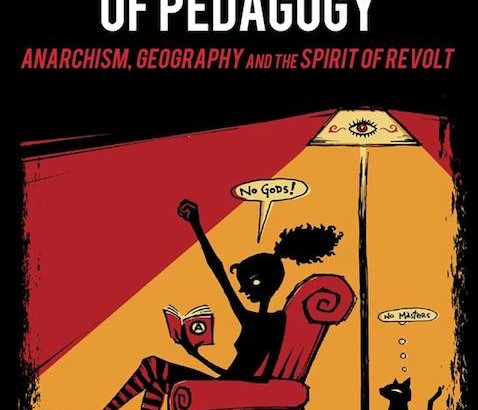
México, /4 de abril de 2016/Ensayo escrito por: Levi Gahman. Fuente: RevistaROAR
Traducción del ensayo: El presente ensayo es un extracto del capítulo de: “Zapatismo frente a la Universidad neoliberal: Hacia una pedagogía contra el olvido”, en el próximo libro de la radicalización de la pedagogía
editado por Simón Springer, Marcelo López de Souza y Richard J. White. La educación no jerárquica de los zapatistas clama por la dignidad y sugiere
que el sufrimiento de la universidad neoliberal puede ser resistido y vencido. La historia de los zapatistas es una de la dignidad a la indignación. Es una saga duradera de más de 500 años de resistencia al intento de conquista de la tierra y la vida de los campesinos indígenas. Es nada menos que una cuenta revolucionaria y poética de la esperanza, la
insurgencia y la liberación, un movimiento que se caracteriza tanto por la adversidad y angustia, como lo es por la risa y el baile. Las crónicas en
curso de la insurrección zapatista proporcionan un dramático relato de cómo
las poblaciones indígenas han desafiado a la imposición de la violencia
estatal, la opresión en los roles de género y el saqueo capitalista. Y para
la gente de las comunidades ch’ol, tseltales, tsotsiles, tojolabales,
zoques y mames de Chiapas, México que toman la decisión de convertirse
zapatista, es una historia renacer, revitalizado y re-aprendido cada nuevo
día, con cada nuevo paso. Este ensayo proporciona una breve visión general
de cómo los zapatistas con su resistencia ofrecen una esperanza a aquellos
que luchan dentro y en contra de la universidad neoliberal. Antes de
profundizar tengo una confesión que hacer. No tengo absolutamente ninguna
fe que el statu quo académico cada vez que se va a reformar. Audre Lorde
nos dice que «las herramientas del maestro nunca se desmantelarán de la
casa del maestro», mientras que Emma Goldman señala que «el elemento más
violento de la sociedad es la ignorancia.» La mayoría de las universidades,
después de todo, fueron ensambladas utilizando la lógica racista y
patriarcal de un maestro ignorante. Es decir, la academia estaba rota, para
empezar, y sigue siendo de esa manera. Por lo tanto, cuando se trata de la
existencia de cualquier entidad o institución que surge de la mentalidad
del colonizador, al igual que la educación neoliberal, estoy de acuerdo con
Frantz Fanon, quien afirma que «hay que sacudirse la pesada oscuridad en la
que estábamos inmersos, y dejarlo detrás.» En resumen, el neoliberalismo,
la corriente de la «pesada oscuridad» del mundo, debe ser echada fuera de
las universidades. Y a pesar del hecho de que un comentario de este tipo
puede ser aparentemente repleto de cinismo y desesperación, en realidad
está profundamente arraigada en el anhelo y la esperanza para la
resistencia. Cuando se habla de «resistencia» hay que ir con cuidado, ya
que es, de hecho, un término que puede significar muchas cosas diferentes
para muchas personas diferentes. El análisis del concepto tsotsil (indígena
maya) de*vokol sts’ikel* , que significa «soportar el sufrimiento.» Y
cuando la resistencia se define de esta manera existen grandes
posibilidades de florecer. Las posibilidades de que la resistencia puede
significar la empatía y el trabajo emocional, así como la compasión y la
ayuda mutua, sin tener en cuenta el calendario de uno y la geografía, o
incluso la universidad. *La base del neoliberalismo es una contradicción:
con el fin de mantenerse a sí mismo, debe devorarse a sí misma, y por lo
tanto, destruirse a s**í** misma. *El neoliberalismo es una fuerza a tener
en cuenta. A nivel mundial, que está exacerbando la dependencia, la deuda y
la destrucción del medio ambiente a gran escala, y a través de la
proliferación de las políticas de libre comercio, que rozan los derechos y
la protección de los trabajadores, los ambientes y las sociedades por
igual. En el plano personal, convence a la gente que el individualismo, la
competencia y la auto-mercantilización son las condiciones naturales de la
vida. En consecuencia, la sociedad civil está obligada a aceptar, a través
de la retórica capitalista manipuladora, que el mundo no es nada más que un
mercado en el que todo, y todo el mundo, pueden ser comprados y
vendidos. La miseria de los demás, entonces, se considera que el daño
colateral meramente de un mundo intrínsecamente sombrío y
fragmentado. Escalofriantemente, la educación superior no es inmune a estas
tendencias malévolas. La obsesión patológica en la generación de ingresos
que los administradores universitarios (e incluso algunos miembros de la
facultad) da precedente a esto (en lugar de fomentar el pensamiento
crítico, la auto-reflexión y praxis). Si uno escucha a los colegas o amigos
que trabajan en la academia, no pasará mucho tiempo para escuchar historias
de ansiedad aguda, depresión y paranoia, así como sentimientos de
desesperación, no pertenencia y desesperanza. La vida en la universidad
neoliberal se ha convertido de esta manera en una «muerte por mil cortes»;
sólo hay que preguntar a cualquier madre que trabaja dentro de ella. Uno de
los productos más desconcertantes, y se pasa por alto, de la educación
superior neoliberal es cómo los estudiantes son tratados por
ella. «Aprender» ahora consiste en la memorización, exámenes
estandarizados, exámenes de altas apuestas, los salones de clase como en la
fábrica, la competencia jerárquica entre pares y la acumulación de enormes
deudas para pagar los crecientes costos de matrícula. Los estudiantes
tienen que navegar por este guante neoliberal y simultáneamente son
presionados para realizar con entusiasmo el papel grotesco de la burguesa:
de «empresario» o «ciudadano global». Paulo Freire llamo a esto: días
deshumanizantes. Sin lugar a dudas, el neoliberalismo ha puesto en marcha
un asalto en toda regla sobre la salud mental de los profesores y
estudiantes por igual, por no mencionar el bienestar de los explotados
fuertemente, contratados los trabajadores, por lo general no sindicados en
los sectores de servicio y mantenimiento de alimentos de muchas
universidades. Estas circunstancias casi imposibles a menudo son las únicas
opciones que muchos tienen. Y una situación en la que es obligatorio para
las personas vigilarse y castigarse a sí mismos, así como otros, para
convertirse en funcionarios que auto promueven la hiper competitiva del
capitalismo. Cabe señalar que el proyecto en curso de la autonomía
zapatista es el resultado directo de la libre determinación de los pueblos
indígenas, así como su decisión de participar en una organización altamente
disciplinada contra una élite neocolonial. Más específicamente, los
zapatistas se sacrificaron para hacer del mundo un lugar mejor y más
seguro. Oportunamente, una de las frases más ampliamente vista dispersadas
a través de los territorios rebeldes de Chiapas es: *Para Todos Todo, Para
Nosotros Nada* («Todo para todos, nada para nosotros»). En la cara del
capitalismo global, tal afirmación es tan profunda como el que es
humilde. Llevar a primer plano de forma explícita la cooperación y el
desinterés; virtudes que los zapatistas han integrado en su sistema de
educación autónoma. Los zapatistas se refiere a las escuelas autorizadas
por el Estado y las universidades como «corrales de pensamiento para la
domesticación» Esto se debe al énfasis que las instituciones legitimadas
por el gobierno en lugar coaccionar a los estudiantes y profesores a
convertirse en dóciles ciudadanos-consumidores. La respuesta zapatista a la
perspectiva de tener que enviar a sus hijos en este tipo de entornos de
aprendizaje hostiles trajo como consecuencia una revuelta abierta y armada.
Por lo tanto, el 1 de enero de 1994, el Ejército Zapatista de Liberación
Nacional (EZLN) reavivó el espíritu de la llamada revolucionaria de
Emiliano Zapata de *Tierra y Libertad* («Tierra y Libertad»), exclamó *¡Ya
Basta!* (¡Basta!). Dada su capacidad de previsión y acciones, uno no puede
dejar de recordar al *anarco comunista geógrafo Peter Kropotkin, que en
1880 declaró: «Hay períodos en la vida de la sociedad humana cuando la
revolución se convierte en una necesidad imperiosa, cuando se proclama a sí
mismo como algo inevitable.»* En la liberación con éxito de edictos
beligerantes del gobierno mexicano, los zapatistas ahora practican la
educación en sus propios términos. Ellos no están en deuda con la
supervisión parroquial de burocracias gerencialistas como muchos de
nosotros en las universidades neoliberales. Por el contrario, la enseñanza
de la filosofía zapatista viene «desde abajo» y está anclada en la tierra y
la costumbre indígena. Su enfoque se ilustra mejor con el axioma de
duelo «Preguntando Caminamos». Las comunidades zapatistas generan sus
«programas de estudios» a través de asamblea popular, la democracia
participativa y la toma de decisiones comunitaria. Las aulas zapatistas por
lo tanto, incluyen lecciones territorialmente situados en agroforestal
orgánica, medicinas naturales a base de hierbas, la soberanía alimentaria y
las lenguas indígenas regionales. Teniendo en cuenta el contexto
geopolítico de su movimiento y, a continuación, los métodos de enseñanza
zapatistas constituyen actos de descolonización en sí mismos. Esto deja a
uno preguntándose si la academia neoliberal podría aprender una cosa o dos
de los zapatistas en lo que respecta a aprobar ambas cosmovisiones
indígenas y la educación basada en el lugar como algo esencial para
cualquier programa de estudio. E incluso, dada la profundidad y amplitud de
los zapatistas en los «planes de estudio,» el objetivo de su pedagogía
puede resumirse en inculcar una cosa: la capacidad de discernimiento. El
zapatismo no es ni un modelo, ni la doctrina. Tampoco es una ideología o
modelo, más bien, es la intuición que se siente dentro de su pecho para
reflejar la dignidad de los demás, lo que agranda mutuamente los
corazones». El zapatismo es también comúnmente se compone de siete
principios :
1. *Obedecer y no Mandar*
2. *Proponer y no Imponer*
3. *Representar y no suplantar*
4. *Convencer y no Vencer*
5. *Construir y sin Destruir*
6. *Servir y no Servirse*
7. *Bajar y sin Subir*
Estas convicciones guían los esfuerzos cotidianos de los zapatistas en la
construcción de lo que ellos denominan como *Un Mundo Donde quepan Muchos
Mundos*. El zapatismo, a continuación, también se puede considerar como la
expresión colectiva de una imaginación radical, la manifestación de una
visión creativa compartida, y una liberación de material de la geografía.
Lo que da lugar a la pedagogía en términos de posibilidades para el
establecimiento de métodos respetuosos de la enseñanza y el aprendizaje que
defienden el reconocimiento (y la práctica) de la mutualidad,
interdependencia, la introspección y la dignidad. Estas facetas no
jerárquicas y anti-neoliberales de la enseñanza zapatista son evidentes en
sus bases. El conocimiento local es tan central entre sus comunidades que
muchas de los promotores educativos vienen y permanecen en los mismos
municipios autónomos como los estudiantes. No hay contratos de sesiones y
los profesores no se desechan después de sólo unos pocos meses en el
trabajo. En el espíritu de igualdad, zapatistas no mantiene ninguna
distinción jerárquica ni rango vertical de entre sus miembros de la
facultad. Todo el mundo es simplemente, y humildemente, un promotor de la
educación. Este vaciado rápido de los títulos profesionales y credenciales
legitimada institucionalmente pone de relieve cómo los zapatistas son
capaces de frustrar las afirmaciones del ego y la autoridad jerárquica,
aboliendo el individualismo competitivo que tan a menudo corrompe
universidades neoliberales. Fundamentalmente, son inquietantes las rígidas
fronteras que dividen «los que saben» de «aquellos que no saben» porque no
hay nada de revolucionario en la arrogancia. Más radicalmente aún, los
zapatistas incorporar la justicia de género (como Ley Revolucionaria de
Mujeres Zapatistas), la soberanía alimentaria, la salud anti-sistémico, y
el discurso raro (como el uso de los términos inclusivos otras-otros, compañeros-compañeras. También no distribuyen las calificaciones finales para
significar el fin del proceso de aprendizaje, y no hay grados se utilizan
para comparar o condenar a los estudiantes. De esta manera, los zapatistas
ponen de relieve cómo la educación no es ni una competencia, ni algo que se
«completó». Estas estrategias han ayudado a los transgresores esencialmente
los zapatistas en la erradicación de la vergüenza del proceso de
aprendizaje, lo que lo consideren necesario a causa de cuán tóxico, la
educación neoliberal mezquino y vicioso puede llegar a ser. Para concluir,
el status quo académico está castigando y debe ser abandonado. El
neoliberalismo ha secuestrado la educación y lo está sosteniendo como un
rehén. Exige su rescate en forma de obediencia, conformidad y el trabajo
libre, a la vez que la disciplina de la curiosidad, la creatividad y la
imaginación de los estudiantes, profesores y trabajadores. La propia
universidad neoliberal es estéril, negligente y conformista; así como
asfixiante, solitario y gris.

Texto original:
The non-hierarchical education of the Zapatistas cries dignity and
suggests that the suffering of the neoliberal university can be withstood
and overcome.
I’ve said it before—in contrast to those traditional stories that begin
with ‘Once upon a time…’ Zapatista stories begin with ‘There will be a
time…’ — Subcomandante Galeano (formerly Marcos)
The story of the Zapatistas is one of dignity, outrage, and grit. It is an
enduring saga of over 500 years of resistance to the attempted conquest of
the land and lives of indigenous peasants. It is nothing less than a
revolutionary and poetic account of hope, insurgency and liberation—a movement characterized as much by adversity and anguish, as it is by laughter and dancing.
More precisely, the ongoing chronicles of the Zapatista insurrection
provide a dramatic account of how indigenous people have defied the
imposition of state violence, oppressive gender roles and capitalist
plunder. And for people of the Ch’ol, Tseltal, Tsotsil, Tojolabal, Mam and
Zoque communities in Chiapas, Mexico who make the decision to become
Zapatista, it is a story reborn, revitalized and re-learned each new day,
with each new step.
It is with this context in mind that I provide a brief overview of how the
Zapatistas’ vibrant construction of resistance offers hope to those of us
struggling within-and-against the neoliberal university.
FOR STS’IKEL VOKOL AND CASTING OUT
Power was trying to teach us individualism and profit…We were not good
students. — Compañera Ana Maria Zapatista Education Promoter
Before we dive too deeply into things, I have a confession to make. I have
absolutely no faith whatsoever that the academic status quo will ever be
reformed. Audre Lorde tells us that “the master’s tools will never
dismantle the master’s house,” while Emma Goldman notes that “the most
violent element in society is ignorance.” Most universities, after all,
were assembled using an ignorant master’s racist and patriarchal logic.
That is, the academy was broken to begin with, and remains that way.
Hence, when it comes to the existence of any entity or institution that
emerges from the colonizer’s mindset, like neoliberal education, I agree
with Frantz Fanon, who states that “we must shake off the heavy darkness in
which we were plunged, and leave it behind.”
In short, neoliberalism, the world’s current “heavy darkness”, must be cast
out, and the universities in which it is being taught must be pummeled into
ruin. And despite the fact that such a comment may seemingly be replete
with cynicism and despair, it is actually deeply rooted in yearning and
hope — for resistance.
When speaking of “resistance” one must tread lightly because it is, indeed,
an intensely contested term. Resistance can mean a lot of different things
to a lot of different people. For this piece then, I draw from (what I feel
is) perhaps the most fertile and most evolved source of resistance that
exists — the Zapatista insurgency.
The analysis that follows is thus informed by the Tsotsil (indigenous Maya)
concept of *sts’ikel vokol*, which means “withstanding suffering.” And when
resistance is defined in this manner possibilities blossom. Possibilities
that resistance can mean empathy and emotional labor, as well as compassion
and mutual aid, regardless of one’s calendar and geography… or even
university.

“DEATH BY A THOUSAND CUTS”
The basis of neoliberalism is a contradiction: in order to maintain
itself, it must devour itself, and therefore, destroy itself. — Don Durito de la Lacandona Beetle, Knight Errant
Neoliberalism is a force to be reckoned with. Globally, it is exacerbating
dependency, debt and environmental destruction on a widespread scale
through the proliferation of free trade policies, which slash the rights
and protections of workers, environments and societies alike.
On a personal level, it convinces people that individualism, competition
and self-commodification are the natural conditions of life. Consequently, civil society is compelled to accept, through manipulative capitalist rhetoric, that the world is nothing more than a market in which everything,
and everyone, can be bought and sold. The misery of others, then, is deemed
to be merely collateral damage of an inherently bleak and fragmented world.
Chillingly, higher education is not immune to such malevolent tendencies.
The debilitating effects that neoliberalism has on higher education have
been written about at length. The pathological obsession on generating
income that university administrators (and even some faculty members) give
precedent to (in lieu of encouraging critical thought, self-reflection and
praxis) is also well documented.
Less attention, however, has been paid to the psychological injuries
inflicted upon people by the disciplinary mechanisms of the neoliberal
university, like scholarly rankings, impact factors, citation metrics,
achievement audits, publication quotas, pressure to win prestigious grants,
award cultures, getting “lines on the CV”, and so on.
If one listens to colleagues or friends working in the academy, it will not
take long to hear stories of acute anxiety, depression and paranoia, as
well as feelings of despair, non-belonging and hopelessness. Life in the
neoliberal university has thereby become a proverbial “death by a thousand
cuts” — just ask any mother working within it.
One of the most disconcerting, and overlooked, products of neoliberal
higher education is how students are treated by it. “Learning” now consists
of rote memorization, standardized tests, high-stakes exams, factory-like
classroom settings, hierarchical competition amongst peers, the
accumulation of massive debts to afford rising tuition costs, and
patronizingly being scolded that “this is what you signed up for.”
Students must navigate this neoliberal gauntlet while also simultaneously
being pressured into enthusiastically performing the grotesque bourgeois
role of “entrepreneur” or “global citizen”. Paulo Freire said there would
be dehumanizing days like this.
Without question, neoliberalism has launched a full-fledged assault on the
mental health of faculty and students alike, not to mention the well-being
of heavily-exploited, contracted, typically non-unionized workers in the
food service and maintenance sectors of many universities. These nearly
impossible circumstances are often the only choices many have in simply
making a go of it in life. And a situation in which it is compulsory for
people to discipline and punish themselves, as well as others, into
becoming hyper-competitive, self-promoting functionaries of capitalism is —
as a Zapatista education promoter so vividly put it — olvido: oblivion.

DECOLONIZATION, AUTONOMY AND THE SPIRIT OF REVOLT
The battle for humanity and against neoliberalism was and is ours, and
also that of many others from below. Against death — We demand life. — Subcomandante Galeano (formerly Marcos)
It should be pointed out that the ongoing project of Zapatista autonomy is the direct result of indigenous people’s self-determination, as well as
their decision to engage in highly disciplined organizing against a
neo-colonial elite. More pointedly, the Zapatistas sacrificed themselves to
make the world a better and safer place.
Fittingly, one of the most widely seen phrases scattered across the rebel
territories of Chiapas reads: Para Todos Todo, Para Nosotros Nada
(“Everything for Everyone, Nothing for Us”). In the face of global capitalism, such a
statement is as profound as it is humble. It explicitly foregrounds
cooperation and selflessness; virtues the Zapatistas have integrated into
their autonomous education system.
As indigenous rebels, the Zapatistas astutely refer to state-sanctioned
schools and universities as “corrals of thought domestication.” This is due
to the emphasis that government-legitimated institutions place on coercing
students and faculty into becoming docile citizen-consumers. The Zapatista
response to the prospect of having to send their children into such hostile
learning environments was open and armed revolt.
Thus, on January 1, 1994, the Zapatista Army of National Liberation (EZLN)
rekindled the spirit of Emiliano Zapata’s revolutionary call for *Tierra y
Libertad*(“Land and Freedom”), cried *¡Ya Basta!* (Enough!), and “woke up
history” by taking back the land they had been dispossessed of.
Given their foresight and actions, one cannot help but be reminded of
anarcho-communist geographer Peter Kropotkin, who in 1880 stated: “There
are periods in the life of human society when revolution becomes an
imperative necessity, when it proclaims itself as inevitable.”
In successfully liberating themselves from belligerent edicts of the
Mexican government (*el mal gobierno*, “the bad government”), the
Zapatistas now practice education on their own terms. They are not beholden
to the parochial oversight of managerialist bureaucracies like many of us
in neoliberal universities are. On the contrary, Zapatista teaching
philosophy comes “from below” and is anchored in land and indigenous
custom. Their approach is best illustrated by the duelling axiom *Preguntando
Caminamos* (“Asking, We Walk”), which sees Zapatista communities generate
their “syllabi” through popular assembly, participatory democracy and
communal decision-making.
These horizontalist processes advance by focusing on the histories,
ecologies and needs of their respective bases of support. Zapatista
“classrooms” therefore include territorially-situated lessons on organic
agroforestry, natural/herbal medicines, food sovereignty and regional
indigenous languages. Given the geopolitical context of their movement,
then, Zapatista teaching methods constitute acts of decolonization in and
of themselves.
This leaves one wondering if the neoliberal academy might learn a thing or
two from the Zapatistas in regard to endorsing both indigenous worldviews
and place-based education as essential to any program of study. And even
given the depth and breadth of the Zapatista’s “curricula,” the goal of
their rogue pedagogy can be summed up as trying to instill one thing: a
capacity for discernment, which they foster through Zapatismo.

ZAPATISMO AS LIBERATION GEOGRAPHY
Liberation will not fall like a miracle from the sky; we must construct it
ourselves. So let’s not wait, let us begin… — Zapatista Pamphlet on Political Education
A kind and good-humored education promoter explained the notion of
Zapatismo to me on a brisk and fog-blanketed weekday morning in the misty highlands of Chiapas. In describing it, they noted: “Zapatismo is neither a model, nor doctrine. It’s also not an ideology or blueprint, rather, it is the intuition one feels inside their chest to reflect the dignity of others, which mutually enlarges our hearts.”
Additionally, as loyal readers of ROAR’s Leonidas Oikonomakis will
recognize, Zapatismo is also commonly comprised of seven principles:
1. Obedecer y no Mandar (to obey, not command)
2. Proponer y no Imponer (to propose, not impose)
3. Representar y no Suplantar (to represent, not supplant)
4. Convencer y no Vencer (to convince, not conquer)
5. Construir y no Destruir (to construct, not destroy)
6. Servir y no Servirse (to serve, not to serve oneself)
7. Bajar y no Subir (to go down, not up; to work from below, not seek
to rise)
These convictions guide the everyday efforts of the Zapatistas in the
building of what they refer to as: Un Mundo Donde Quepan Muchos Mundos (“A
World Where Many Worlds Fit”). Zapatismo, then, can also be thought of as
the collective expression of a radical imagination, the manifestation of a
shared creative vision, and a material liberation of geography.

What it gives rise to in terms of pedagogy are possibilities for
establishing respectful methods of teaching and learning that champion the
recognition (and practice) of mutuality, interdependency, introspection and
dignity.
These non-hierarchical/anti-neoliberal facets of Zapatista teaching are
evident in the grassroots focus they take. Local knowledge is so central
amongst their communities that many of the promotores de educación (education
promoters) often come from, and remain in, the same autonomous
municipalities as the students. There are no sessional contracts and
teachers are not disposed of after only a few months on the job.
In the spirit of equality, Zapatistas maintain neither hierarchical
distinction nor vertical rank amongst their “faculty members.” Everyone is
simply, and humbly, an education promoter. This jettisoning of professional
titles and institutionally-legitimated credentials highlights how the
Zapatistas are able to thwart assertions of ego/hierarchical authority and
abolish the competitive individualism that so often corrupts neoliberal
universities. Fundamentally, they are unsettling the rigid boundaries
dividing “those who know” from “those who do not know” — because there is
nothing revolutionary about arrogance.
Even more radically, the Zapatistas incorporate gender justice (like
Zapatista Women’s Revolutionary Law), food sovereignty, anti-systemic
healthcare, and queer discourse (like using the inclusive terms otros/otras, compañeros/compañeras, and so on, as well as “otherly” as a whimsical and respectful compliment) into their day-to-day learning.
They also do not distribute final marks to signify an end to the learning
process, and no grades are used to compare or condemn students. In these
ways, the Zapatistas underscore how education is neither a competition, nor
something to be “completed”. These transgressive strategies have
essentially aided the Zapatistas in eradicating shame from the learning
process, which they deem necessary because of just how toxic, petty and
vicious neoliberal education can become.
To conclude, the academic status quo is punishing — and must be abandoned.
Neoliberalism has hijacked education and is holding it hostage. It demands
ransom in the form of obedience, conformity and free labor, whilst also
disciplining the curiosity, creativity and imagination out of students,
faculty and workers. The neoliberal university itself is sterile, negligent
and conformist; as well as suffocating, lonely and gray.

Collective resistance is exigent because we need a new burst of hope amidst such a “heavy darkness” — and Zapatismo nurtures hope. Not hope in an abstract sense of the word, but the type of hope that when sown through compassion and empathy, and nourished by shared rage, resonates and is felt.
Zapatismo gives rise to the kind of hope that comforts affliction, enlarges
hearts and wakes up history. The kind of hope that causes chests to swell,
jaws to clench and arms to lock when others are being humiliated or hurt — regardless of whether it be by individual, institution, system, or
structure.
Zapatismo cries dignity and suggests the suffering of the neoliberal
university can be withstood and overcome, because truth be told,
neoliberalism is not an ominous, panoptic master — it is simply a reality. And
realities can be changed — just ask a Zapatista.
Fuente del ensayo y las imágenes: roarmag.org/essays/neoliberal-education-zapatista-pedagogy/






 Users Today : 84
Users Today : 84 Total Users : 35459550
Total Users : 35459550 Views Today : 134
Views Today : 134 Total views : 3417892
Total views : 3417892